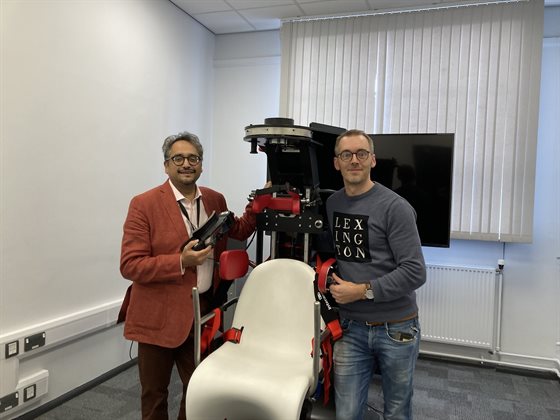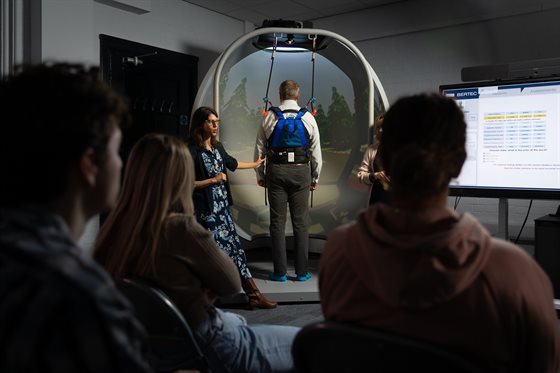New state-of-the-art teaching equipment worth hundreds of thousands of pounds has been unveiled at De Montfort University Leicester (DMU).
The university is set to be the first in the country to use the Bertec Computerised Dynamic Posturography™ (CPD/IVR) and the TRV Chair – named after its inventor Thomas Richard-Vitton – as part of its teaching.

Rakesh Patel and Daniel Petersson with the new TVR Chair, which students will be able to use from the start of the 2022/23 academic year
The début of the new equipment comes after DMU’s School of Health and Life Sciences was awarded a £2 million investment by the Office for Students (OfS) to develop several cutting-edge simulation suites for healthcare students.
The equipment will help Audiology students better diagnose and treat balance/dizziness conditions. Rakesh Patel, Associate Head of School and Associate Professor in Audiology, said: “Having the Bertec CPD/IVR significantly benefits the training of students adding to their CV and enhancing their skills ready for clinical practice.
“The Bertec CPD/IVR is an immersive experience that fools your senses. It can assist in identifying very minor balance deficits that may have been missed.
“So, for example, we will be able to see if you have minor issues with depth perception by tricking your visual senses and having the pressure pads on the floor match your movement and mislead your senses in your limbs. If you have any vestibular problems, these will become prominent.
“The CPD/IVR can help with a wide range of sporting injuries, speeding up the rehabilitation for athletes.
“Not only are we hoping to improve our students’ experience with this kit, but we’re also hoping to improve research into balance and medical conditions across the wider East Midlands.”

The Bertec CPD/IVR in use
Housed in the Hawthorn Building, the NASA egg-shaped CPD/IVR equipment takes a huge step into investigating balance function. Patients are measured through six tests before being immersed in a virtual environment and tasked to manoeuvre through the digital world.
Staff and students can analyse the data and develop personalised rehabilitation plans
The TRV Chair was designed to assist and treat the most common cause of dizziness Benign Paroxysmal Positional Vertigo (BPPV)
BPPV is caused by tiny crystals called otoconia, connected with balance and orientation, in the ear becoming dislodged and causing involuntary eye movements, which can make the room appear that it is rotating/spinning.
Students and staff using the TRV Chair will be able to rotate their patients in all plains of motion to return the dislodged crystals into the organs for reabsorption. Infra-red cameras in a special headset monitor eye movements to determine where the crystals are within the ear.
Daniel Petersson, Specialist Vestibular Physiotherapist, has been using the TRV Chair for approximately five years at his clinic in Sweden. He was giving a demonstration of the chair to Eyes Nose Throat (ENT) surgeons, audiologists, and physiotherapists as part of the annual Leicester Balance Course.
He said: “The chair is very accurate and allows patients to consistently get a more detailed BPPV diagnosis. This method isn’t reliant on issues like patient mobility, unlike older methods that could restrict how if the patient had an issue with the spine.
“By using the TRV Chair, students can move their patients more freely, putting them in different positions and letting gravity do the work. From there we can monitor the position of the otoconia in the canal to understand the severity of their condition.”
VIDEO
Organised each year by Rakesh Patel and Professor Peter Rea, Consultant ENT Surgeon at Leicester Royal Infirmary, the three-day Leicester Balance Course is an educational programme for clinicians nationally and internationally, held at DMU.
The programme included a series of panel discussions on causes of recurrent vertigo and new investigations into balance disorders, as well as interactive sessions with the CPD/IVR and the TRV Chair and other cutting-edge equipment and facilities.
Posted on Tuesday 4 October 2022